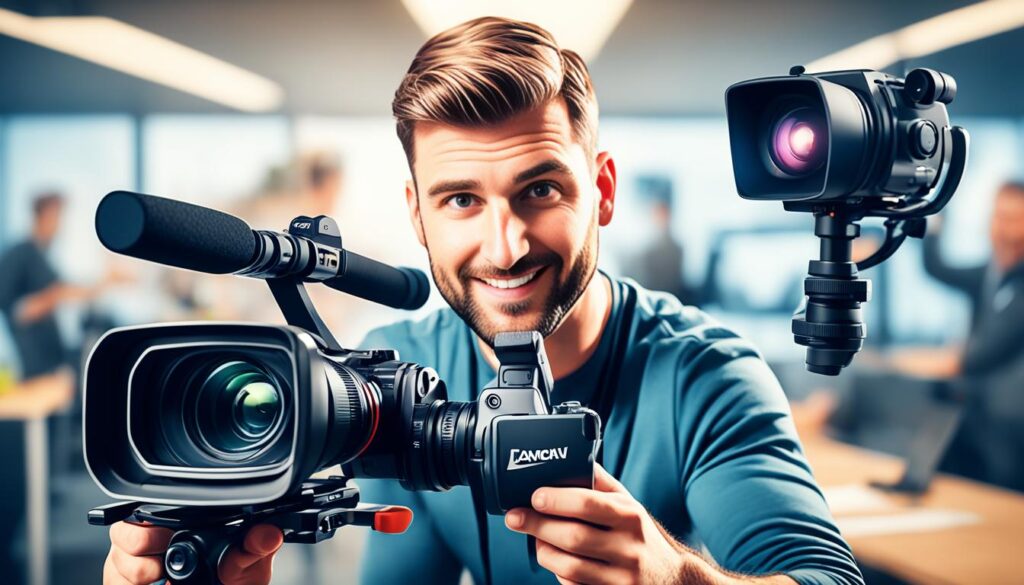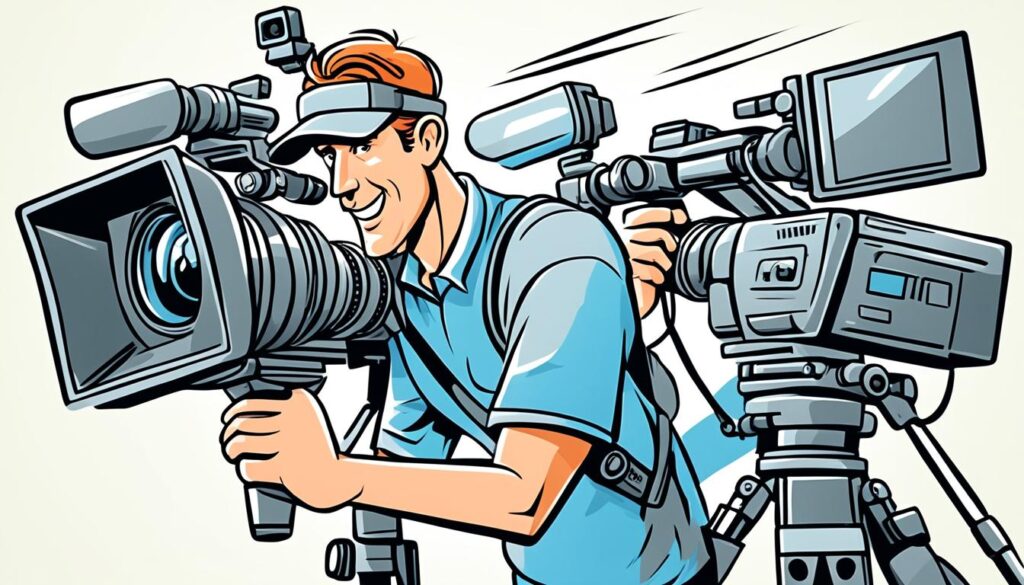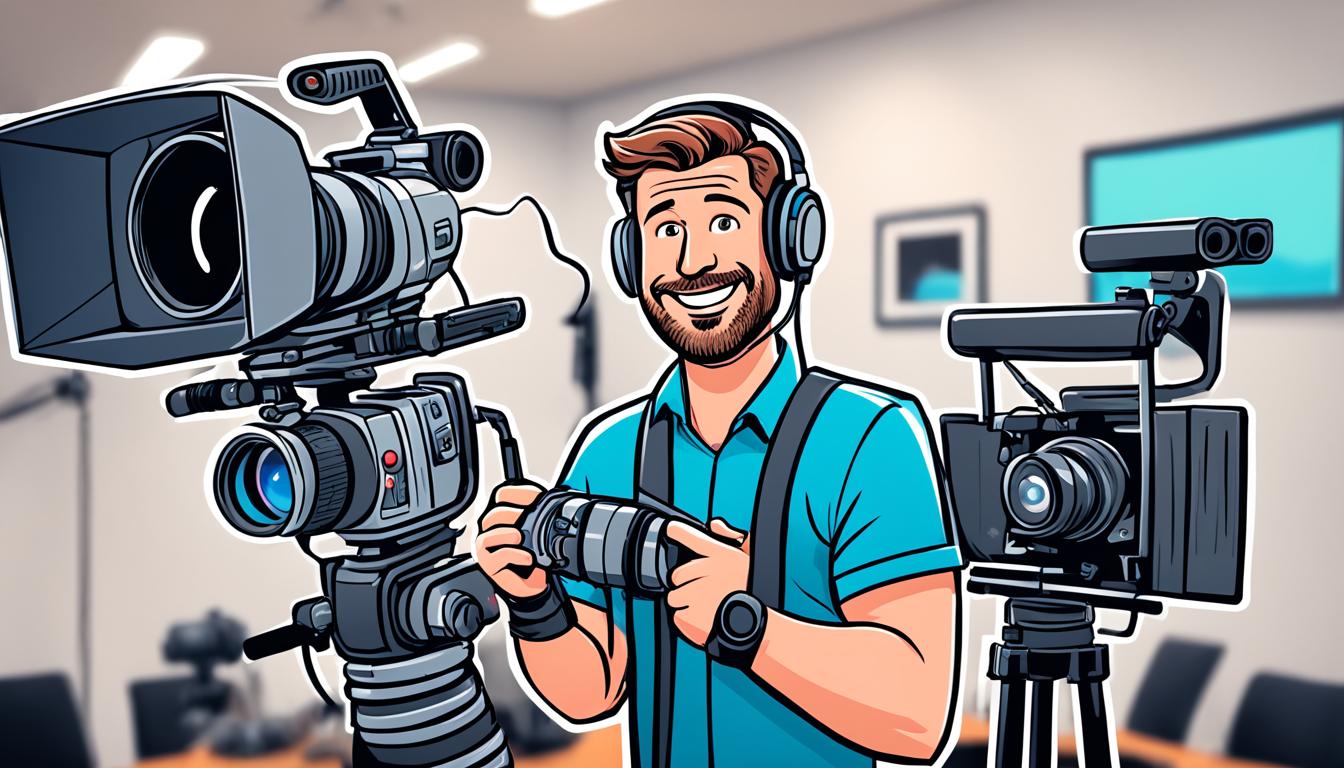The captivating world of video content could not materialize without the pivotal role of a videographer. Serving as the linchpin in a complex process, these professionals employ their sharp expertise to transform abstract ideas into tangible visual narratives. Through the lens of their cameras, videographers bear the weight of the video’s entire story, capturing poignant moments, lush landscapes, and heartfelt human emotions with precision and grace. As custodians of videography services, they hold the responsibility of not just recording, but also sculpting a series of fleeting instants into a cohesive, compelling story that resonates with audiences far and wide.
Remaining on the cutting-edge of video production techniques, the professional videographer is not just a technician but a craftsman, blending art with the science of digital imagery. From planning and shooting to editing, every step is a delicate dance between technology and creativity, with the videographer orchestrating each move. It’s a multifaceted role that requires an eye for detail, a steady hand, and a story-driven mindset.
Key Takeaways
- Videographers are essential to transforming ideas into visual stories.
- The broad scope of a videographer’s work spans pre-production to post-editing stages.
- Technical skills and artistic vision combine to create engaging video content.
- Continuously learning new video production techniques is vital for success.
- A videographer’s capacity to adapt is as crucial as their technical know-how.
What is the Role of a Videographer?
The essence of a videographer’s position lies in their ability to weave visual narratives that capture the intended message of their clientele. Propelled by ever-evolving filming equipment and video editing software, the role of a videographer is to not only understand the technical aspects of video production but to also possess the creative acumen to convey stories thorough video. The multifaceted responsibilities of a videographer stem from pre-production planning stages to post-production video editing processes.
A professional videographer is tasked with scriptwriting, storyboarding, and logistics management, ensuring that each project adheres to the set timelines and quality standards. In the realm of production, their expertise extends to operating various types of filming equipment and selecting the right tool for each scenario. Whether it’s a stabilizer for a fluid tracking shot, the right lens for a compelling portrait, or the appropriate lighting setup for mood depiction, the videographer’s arsenal is comprehensive.
Advancements in video editing software such as Adobe Premiere Pro, Apple’s Final Cut Pro, and Windows Movie Maker have further elevated the videographer’s role. The ability to intricately cut, splice, color-grade, and add effects to footage transforms raw material into captivating stories. A videographer’s skill set enables them to bridge the gap between a client’s concept and a final, polished product that resonates with its intended audience, distributed across diverse platforms.
| Filming Equipment | Core Function |
|---|---|
| Cameras (DSLRs, Mirrorless, Cinema) | Capture high-quality video content |
| Audio Equipment (Microphones, Recorders) | Record clear and crisp sound |
| Lighting Kits | Enhance visual appearance and set mood |
| Stabilization Gear (Tripods, Gimbals) | Ensure smooth and steady footage |
| Drones | Provide aerial shots and unique perspectives |
Through the integration of creative vision, mastery of technology, and nuanced storytelling, videographers play a pivotal role in the fabric of multimedia content creation. They are the architects of visual media, constructing immersive experiences that inform, entertain, and inspire.
Videography Skills: Beyond the Camera

A professional videographer not only captures footage but imbues it with meaning and emotion, leveraging a multitude of skills to create compelling narratives. Their work rides on the crux of technical skill, artistic vision, and editing prowess—elements that when combined, result in the creation of truly captivating visual content.
Technical Proficiency with Film Equipment
Videographers excel in handling various types of film equipment, from high-definition cameras to intricately controlled drones. Their videographer skills encompass setting up and calibrating this hardware to suit the demands of different shooting environments. This proficiency ensures that videography services provided are of the highest standard, be it in the electro-dynamic buzz of a cityscape or the serene quietude of a natural landscape.
Artistic Vision in Video Storytelling
While technical knowledge is important, a videographer’s artistic vision is crucial in differentiating an ordinary video from an extraordinary one. It’s their unique perspective that guides the narrative arc of the video content, ensuring it aligns with the intended message or story. A professional videographer’s portfolio often reflects this blend of skill and imagination, showcasing their ability to transform mundane scenes into compelling stories.
Editing Mastery with Video Editing Software
Once the footage is captured, the videographer’s responsibilities shift to the nuanced process of editing. Mastery in video editing software is paramount, enabling the professional videographer to craft a seamless and impactful final product. Whether it’s Adobe Premiere Pro, Final Cut Pro X, or DaVinci Resolve, the editing suite becomes their canvas, where raw footage is sculpted into a coherent and engaging narrative. It’s here in post-production that the videographer’s vision truly comes to life.
| Key Competency | Software/Resources | Description |
|---|---|---|
| Editing & Post-Production | Adobe Premiere Pro, Final Cut Pro X | Finesse raw footage into polished content, adding special effects and ensuring continuity |
| Audio Enhancement | Pro Tools, Adobe Audition | Refine the audio quality for clarity and impact, a crucial aspect of any production |
| Color Correction | DaVinci Resolve, Magic Bullet Looks | Adjust the coloring of footage to evoke the desired mood or atmosphere |
| Motion Graphics | Adobe After Effects | Integrate visual effects and animations to supplement storytelling |
The combined facets of technical mastery, artistic vision, and editing expertise are not just desirable attributes but essential components that underline the videographer portfolio. Only through this synergy can truly immersive and resonant videography be consistently delivered.
Key Responsibilities in the Video Production Process
The craft of videography is a cornerstone within the video production landscape and requires a myriad of talents that encompass both technical and creative proficiencies. At the heart of a project, videographers bear the mantle of key contributors where their responsibilities range widely to encapsulate the essence of storytelling through moving images. Not only are they tasked with the capture of visual content but also its advanced crafting through post-production refinement.
Videographer responsibilities are comprehensive and multifaceted, necessitating fluency in a variety of video production techniques as well as a treasure of videographer skills to navigate through the complexities of their role. A typical videographer’s workday may include the following essential duties:
- Collaborating with clients and creative teams to establish video objectives and ensure that the content aligns with the project’s vision.
- Choosing and setting up the correct filming equipment to achieve desired visual outcomes.
- Calibrating cameras, lighting, and audio devices to cope with different shooting environments and scenarios.
- Securing additional “B-roll” footage to aid in storytelling and provide flexibility during editing.
- Conducting live monitoring of video feeds to ensure quality and consistency.
- Executing interviews with subjects, imparting a sense of comfort and professionalism to capture genuine responses.
Post-production stages witness videographers stepping into an editing suite where they sculpt the raw footage into a polished, cohesive narrative. This typically includes tasks such as:
- Trimming clips and sequencing them into a flowing story.
- Integrating text, graphics, and special effects to enhance the video’s message and aesthetics.
- Adjusting audio levels and sound quality to ensure clarity and impact.
- Outputting the final product in various formats for distribution across multiple channels.
Moreover, videographers flourish in their adaptability, resilience, and unyielding determination to present high-caliber content that resonates with and captivates the intended audience. They remain ever-ready to capture significant moments, subtle emotions, and dynamic actions regardless of the setting, whether it’s during a bustling wedding or within the critical confines of a breaking news scene.
| Pre-Production Tasks | Production Duties | Post-Production Responsibilities |
|---|---|---|
| Client consultation | Setting up equipment | Raw footage cataloging |
| Storyboarding | Directing shoots | Video editing |
| Location scouting | Capturing interviews | Adding visual effects |
| Equipment selection | Monitoring live video feeds | Sound design and mixing |
These assorted tasks, when executed proficiently, translate into a comprehensive video production that stands testament to the videographer’s meticulous efforts and advanced capabilities. It is a career path that fosters continuous learning and growth as new technologies and artistic trends surface within the dynamic sphere of video creation.

Conclusion
The journey through the realm of video production reveals that the role of a videographer surpasses mere camera work; it’s a symphony of technical wizardry and creative storytelling. What is the role of a videographer if not to weave a visual tale so striking that it persists in memory? They hold the power of managing sophisticated film gear with a finesse that can only come from profound technical knowledge and hands-on experience. A videographer’s portfolio is a testament to their skill in capturing arresting images that convey emotions and narratives.
Moreover, videography services are not simply about recording; they bring a moment, a concept, or a story to life. Videographers stand at the crossroads where art meets technology, crafting stories through video by translating the essence of human experiences into a language that can be felt, seen, and heard. The adeptness at editing—with the proficiency to manipulate advanced software—allows the videographer to sculpt raw footage into a seamless narrative that resonates with viewers far and wide.
As we round off this exploration, it is clear that a videographer is a vital cornerstone within the multimedia sector. With an unyielding commitment to their art, they continue to redefine storytelling, keeping pace with rapid advancements in technology to elevate our visual experiences. Their contributions mold the very fabric of our diverse media landscape, skillfully constructing visual narratives that inform, entertain, and preserve our personal and collective chronicles.
Key Responsibilities in the Video Production Process
What exactly does a videographer do?
A videographer is responsible for capturing and creating video content, which involves planning, shooting, and editing footage to produce a final video product. They manage the technical aspects of filming, including operating cameras and handling other filming equipment, and they also take part in the creative process, developing the project’s artistic vision.
What types of videography services do professional videographers offer?
Professional videographers offer a wide range of services, including corporate videos, commercials, documentaries, event coverage (such as weddings or concerts), educational videos, and more. They provide end-to-end video production, from concept development to post-production editing.
What are some essential video production techniques that videographers must master?
Videographers must be skilled in techniques such as camera movements (panning, tilting, tracking shots), framing compositions, lighting setups, audio recording, and selecting the right lens for the desired effect. They also need to understand how to storyboard, script, and plan a shoot to ensure efficient production and high-quality outcomes.
What equipment is essential for a professional videographer?
Essential equipment for a professional videographer includes a high-quality video camera or DSLR, lenses of varied focal lengths, tripods, stabilizing equipment such as gimbals, lighting kits, external microphones, memory cards, and backup drives. Additionally, they need access to a computer with powerful video editing software to edit and finalize their footage.
Can you detail the responsibilities of a videographer during a shoot?
During a shoot, videographers are responsible for setting up cameras and other recording equipment, capturing high-quality footage, directing talent or conducting interviews, monitoring sound and video feeds, troubleshooting technical issues, and ensuring that the project remains on schedule and within budget.
How does video editing software enhance a videographer’s work?
Video editing software allows videographers to piece together footage, edit out unwanted parts, color grade, sync audio and video tracks, add special effects, and create a polished and cohesive final product. Mastery of such software can greatly enhance storytelling and the visual impact of the video content.
Technical Proficiency with Film Equipment
Videographers need to have in-depth knowledge of operating a range of film and audio equipment, including cameras, lenses, gimbals, drones, microphones, and lighting. They must understand how to set up and calibrate this equipment to capture the best possible footage under various conditions.
Artistic Vision in Video Storytelling
Artistic vision is key to producing compelling and engaging video content. Videographers must be able to envision the final product during the planning stages, choose shots and angles that enhance the narrative, and use their creativity to tell a story or convey a message effectively through visual means.
Editing Mastery with Video Editing Software
Videographers must have expertise in video editing software such as Adobe Premiere Pro, Final Cut Pro, or DaVinci Resolve. These tools enable them to create smooth transitions, maintain continuity, integrate graphics and effects, and sculpt the narrative in post-production to deliver impactful video content.
In what ways do videographers collaborate with other team members?
Videographers work closely with directors, producers, scriptwriters, editors, sound engineers, and other crew members. Collaboration is essential for conceptualizing the video project, coordinating production schedules, and ensuring that each aspect of the video aligns with the project’s vision and goals.
What are some challenges videographers typically face on the job?
Videographers often face challenges such as tight deadlines, difficult shooting conditions, technical equipment failures, budget constraints, and client revisions. They must be adaptable, resourceful, and able to resolve issues quickly to keep the production moving smoothly.






